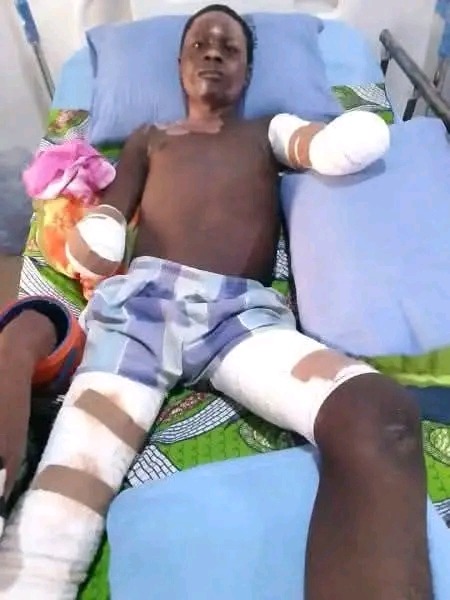Taraba Poly Student Loses Both Hands While Hoisting PDP Flag: A Story of Pain, Survival, and Hope
A 100-level student of Taraba State Polytechnic, Iorhee Saanmoyol Paul, is currently living through a heartbreaking reality after a tragic accident left him without both hands. What was supposed to be a routine political activity on campus turned into a life-altering incident that has shaken many Nigerians and sparked calls for better student safety during political campaigns.
The Day That Changed Everything
The incident occurred on May 21, 2025, just outside the main gate of Taraba State Polytechnic in Jalingo. According to eyewitness reports, Paul had volunteered to hoist the Peoples Democratic Party (PDP) flag at a rally site organized by youth supporters. However, what seemed like a harmless act turned fatal when the metal flagpole accidentally touched a high-tension electric wire.
The result was a devastating electric shock that sent Paul crashing to the ground. Students and bystanders rushed to his aid and immediately transported him to Gilead Hospital in Jalingo. Due to the severity of the injuries, he was later transferred to the National Orthopedic Unit within the Taraba State Specialist Hospital for advanced care.
Medical Emergency and Amputation
Doctors fought to save Paul’s limbs for nearly a month, administering intensive care around the clock. Sadly, on June 19, 2025—after 28 days of battling complications—medical professionals made the difficult decision to amputate both hands in order to save his life. The amputation was carried out under emergency conditions, and Paul is still under hospital observation.
Despite the trauma, Paul remains thankful. “When I woke up in the hospital and saw I had no hands, I asked myself, ‘Why am I still alive?’ But then I remembered what the Bible says: there is nothing you can give in exchange for your life. So I must thank God,” he shared with teary eyes.
Support From the Government and Community
In a show of support, the Taraba State Government has taken responsibility for his medical bills. Local authorities, including the Coordinator of “Operation Keep Taraba Clean,” Mr. Iliya Kefas, have visited Paul in the hospital and expressed their concern and support.
Kefas noted that while it is commendable that the government has paid for Paul’s treatment, there is still more to be done. “Paul’s case is not just medical—it’s emotional, economic, and educational. He needs prosthetic limbs, vocational rehabilitation, and long-term psychological support,” Kefas stated.
The event has sparked national conversations around political campaign safety, student involvement in high-risk activities, and the role of institutions in ensuring the welfare of their students during rallies.
A Future in Question
Paul, who was only just beginning his academic journey, had dreams of becoming a successful professional in his field. Now, those dreams are uncertain. “Today, my classmates are sitting for their first-semester exams. And I’m here,” he said. “But even that—being alive—is a gift I must not take for granted.”
He expressed deep gratitude to everyone who has supported him so far but also made a heartfelt appeal for additional help. “I want to thank the government and everyone who stood by me. But I still need assistance. Prosthetic arms, therapy, and support to find a new path in life. I don’t want to be seen as just a victim. I want to live again.”
Public Reactions
Many Nigerians have expressed sympathy and outrage over the incident. On social media, users questioned the safety protocols in place during student political activities and demanded answers from the school and party organizers. “Why was there no safety officer? Why are students being used to hoist flags near high-tension wires?” one user wrote on X (formerly Twitter).
Others have started online fundraising efforts and called for awareness campaigns in schools to educate students on electrical safety, especially during public events.
Lessons and The Way Forward
This tragedy shines a light on multiple issues: lack of safety awareness, poor planning around student political involvement, and the need for emergency response policies in Nigerian higher institutions. While politics is a part of youth engagement, it should never come at the cost of lives or health.
For now, the most urgent concern is helping Paul rebuild his life. Several NGOs and civil groups have indicated interest in supporting him, and discussions are ongoing with prosthetic suppliers who may provide artificial limbs at reduced or subsidized rates.
More importantly, this case should not fade into silence. Let Paul’s situation become a wake-up call to all institutions, political groups, and government agencies on the importance of safety, planning, and student protection.
How You Can Help
Those who wish to assist Paul financially, morally, or professionally are encouraged to reach out to the Taraba State Specialist Hospital or the Ministry of Youth and Social Development in the state.
Every small effort counts. Whether it’s a message of encouragement, a donation for prosthetic support, or a scholarship fund for vocational rehabilitation—now is the time to act.
Conclusion
Life can change in an instant. For Paul, it changed with the simple act of raising a flag. But from the pain has emerged a new story—one of survival, resilience, and faith. And while he may no longer have hands, he still has a voice, a soul, and a future—if we all come together to support him.
May his strength inspire others. And may his story lead to change.

